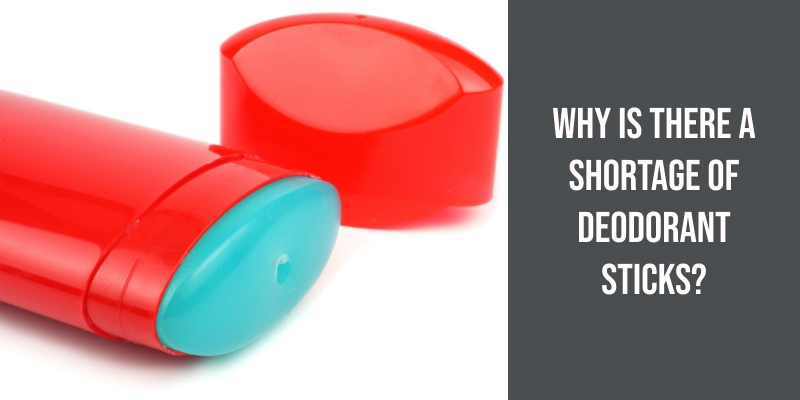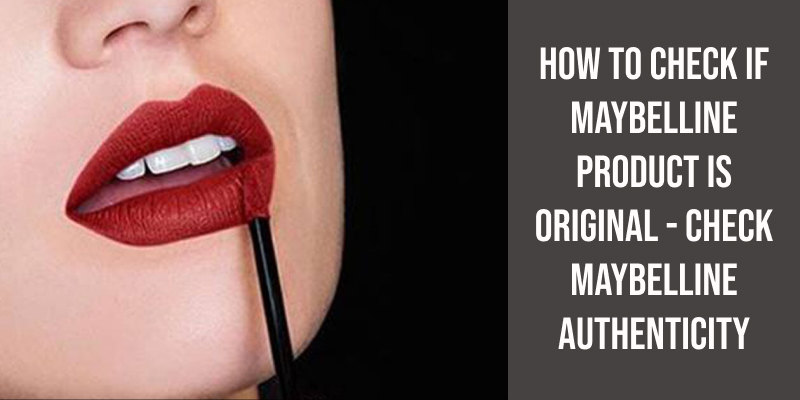The shortage of deodorant sticks is largely due to the impact of the COVID-19 pandemic. COVID-19 caused disruptions in production and supply chains around the world, as companies were forced to shut down or limit their operations to maintain social distancing and comply with health regulations. Particularly for deodorant sticks and other personal care items, there has been a higher demand as people started to pay more attention to personal hygiene. While manufacturers are trying to increase production, they face challenges of shortage of raw materials and packaging resources due to the same global supply chain disturbances. Combined, these factors have created a scarcity in the market of deodorant sticks.

Is Stick Deodorant Healthier Than Spray?
Propylene glycol is a common ingredient in many cosmetic and personal care products, including deodorants. Studies have linked this chemical to skin irritation, allergic reactions, and even organ toxicity. Parabens, on the other hand, are preservatives that are added to prevent the growth of bacteria and fungi in deodorants. However, research has shown that parabens can mimic estrogen in the body, potentially leading to hormonal imbalances and breast cancer.
When it comes to choosing between stick deodorant and spray deodorant, there are several factors to consider. For one, some people find that spray deodorants irritate their skin or cause respiratory problems. On the other hand, stick deodorants can leave behind white marks on clothing and may not provide as much coverage as spray deodorants.
In terms of effectiveness, both types of deodorants can be equally effective at preventing odor and sweat. However, some people prefer one over the other based on their individual preferences and needs. For example, if you need a deodorant for heavy sweating or intense physical activity, you may want to opt for a clinical-strength stick deodorant.
While stick deodorants may be safer in terms of benzene contamination, they may also contain other harmful ingredients. It’s important to read the label and do your research to choose a deodorant that works for you and is free from potentially harmful chemicals.
Nowadays, more people are seeking aluminium-free deodorants for their personal care routine. There are various options available in the market that offer natural and effective alternatives to traditional deodorants that contain harmful chemicals. If you’re looking to switch to an aluminium-free deodorant, we’ve compiled a list of the best options to help narrow down your choices.
What Is the Disadvantage of Stick Deodorant?
Additionally, some stick deodorants contain harmful chemicals such as parabens, aluminum, and triclosan that can be absorbed into the skin and potentially cause health issues. These chemicals have been linked to breast cancer and other diseases, so it’s important to read labels and opt for natural, aluminum-free deodorants.
Some people may be sensitive to certain ingredients or fragrances, leading to redness, itching, or rashes on the skin. This can be uncomfortable and unsightly, and may require switching to a different brand or type of deodorant.
Stick deodorant can also be less effective than other types of deodorants, especially for people with excessive sweating or body odor. Some formulas may not last all day or may require frequent reapplication, which can be inconvenient and embarrassing. For these individuals, alternative options such as clinical strength deodorants or antiperspirants may be more effective.
Moreover, stick deodorant can be problematic for travel or on-the-go use. It can be bulky and take up valuable space in a carry-on bag or purse, and may not be allowed through airport security. Additionally, the stick form can be messy and difficult to apply in certain situations, such as in a crowded restroom or in a car.
From staining clothes to causing potential health concerns, it’s important to weigh the pros and cons and choose a deodorant that best fits your individual needs and preferences. Considering natural and non-toxic options may also be a wise decision for overall health and well-being.
Benefits of Natural and Aluminum-Free Deodorants
Natural and aluminum-free deodorants offer numerous benefits compared to traditional antiperspirants. They contain natural ingredients such as essential oils, baking soda, and coconut oil that combat body odor without blocking sweat glands. This allows your body to still sweat and release toxins, which is important for optimal health. Additionally, natural deodorants are free of harmful chemicals such as parabens, phthalates, and synthetic fragrances, making them a safer option for those with sensitive skin. They also come in a variety of scents, making it easy to find one that suits your preferences. Ultimately, switching to a natural and aluminum-free deodorant can promote a happier, healthier lifestyle.
Which Deodorants Are Aluminium Free?
If you want to avoid aluminum in your deodorant, there are plenty of options on the market. One popular choice is the Blu Atlas Classic Deodorant, which is aluminum-free and also free of parabens, sulfates, and other harmful ingredients. This deodorant is made with natural ingredients like shea butter and coconut oil, and it comes in a range of scents to suit your preferences.
Another great option is the Salt & Stone Bergamot & Eucalyptus Natural Deodorant, which is also free of aluminum, parabens, and other harmful ingredients. This deodorant uses natural ingredients like baking soda and arrowroot powder to neutralize odors, and it’s a fresh scent thats perfect for both men and women.
If youre looking for a luxurious deodorant thats also good for your skin, check out the Sol de Janeiro Rio Deo. This aluminum-free deodorant is infused with skin-nourishing ingredients like coconut oil, acai, and cupuaçu butter, and it’s a lovely tropical scent that will transport you straight to the beach.
For a deodorant thats both effective and gentle on your skin, try the Drunk Elephant Sweet Pitti™ Deodorant Cream. This deodorant is free of aluminum, baking soda, and other harsh ingredients, and it uses natural ingredients like mandelic acid and marula oil to keep you smelling fresh all day long.
If youre a fan of Glossiers minimalist aesthetic, youll love their aluminum-free deodorant. This deodorant has a lightweight, gel-like texture that absorbs quickly and won’t leave any residue on your clothes, and it’s a subtle, fresh scent thats perfect for everyday wear.
Finally, if youre looking for an all-natural deodorant thats also effective, try Ursa Majors Hoppin Fresh Deodorant.
The Secret deodorant lawsuit isn’t the only case in the industry where manufacturers have been accused of misleading advertising and harmful product ingredients. Old Spice and Secret, both owned by Procter & Gamble, have faced similar criticism in the past. In fact, some lawsuits have been filed against the company for failing to screen their aerosol deodorant spray products for harmful chemicals, which puts consumers at risk of developing cancer. This highlights the importance of companies taking adequate measures to safeguard their consumers’ health and well-being.
What Is the Secret Deodorant Lawsuit?
The Secret deodorant lawsuit is a legal case that’s been brought against Procter & Gamble, the manufacturer of Secret antiperspirant/deodorant for women. The lawsuit alleges false and misleading advertising, as well as claims that the company failed to adequately screen it’s aerosol deodorant spray products for harmful chemicals. The accused chemicals include benzene, which is a known carcinogen that’s been linked to various types of cancer.
In addition to the benzene issue, the lawsuit also claims that Procter & Gamble engaged in false and misleading advertising. Specifically, the company is accused of making claims about the safety and effectiveness of their Secret deodorant products that aren’t supported by scientific evidence. This has caused many consumers to question the truthfulness of the companys marketing claims, and has led to calls for greater transparency in the industry.
The lawsuit filed against Procter & Gamble is just one example of the growing concern over the safety of personal care products. Many consumers are becoming more conscious about the ingredients in the products they use, and are demanding better disclosure and testing of potentially harmful chemicals. This trend has led to greater scrutiny by regulatory agencies and lawmakers, who’re now considering new laws and regulations to protect consumers from potentially dangerous products.
It’s always important to stay informed about product recalls, especially when it comes to personal care items. In recent news, HRB Brands has issued a recall on certain aerosol spray deodorant and antiperspirant products due to the potential presence of a harmful chemical. Read on to learn more about the details of this recall and how to keep yourself safe.
Is Sure Stick Deodorant Recalled?
HRB Brands has issued a voluntary recall of all Sure and Brut aerosol spray deodorant and antiperspirant with an expiration date before August 2023 due to the presence of benzene. Benzene is a potential human carcinogen that’s been linked to increased risk of leukemia and other cancers. The recall affects both mens and womens versions of the products.
The affected deodorants were sold across the United States and can be identified by the expiration date printed on the bottom of the can. Customers who’ve purchased any of the recalled products are advised to stop using them immediately and to return them to the store where they were purchased for a full refund. The company is also offering a toll-free number for consumers who’ve questions about the recall.
This isnt the first time that benzene has shown up in cosmetic and personal care products. The chemical has been detected in a range of products, including sunscreen, hair dye, and nail polish. The U.S. Centers for Disease Control and Prevention warn that exposure to high levels of benzene can cause dizziness, headaches, and even death.
The voluntary recall by HRB Brands underscores the importance of regular testing and monitoring of personal care products. Consumers are encouraged to check the ingredients and expiration dates of the products they use to ensure they’re safe. It’s also important for companies to prioritize consumer safety and act quickly if a potential health risk is identified.
In the wake of the Sure and Brut recall, environmental and consumer advocacy groups are calling for stronger regulation of cosmetics and personal care products. The Food and Drug Administration is currently reviewing the safety of cosmetics and considering updates to it’s regulations, including new standards for testing and labeling. As consumers become more concerned about the safety of the products they use, it’s important for regulators and industry to work together to ensure the safety of these everyday items.
Alternatives to Aerosol Spray Deodorants and Antiperspirants That Do Not Contain Benzene or Other Harmful Chemicals
Aerosol spray deodorants and antiperspirants often contain harmful chemicals like benzene, which can have negative impacts on health. Alternatives to these products include natural deodorants and antiperspirants that use ingredients like baking soda, cornstarch, and essential oils. Roll-on and stick deodorants are also options that don’t contain harmful chemicals. It’s important to read product labels and research ingredients before purchasing to ensure the product is safe.
Conclusion
In conclusion, the current shortage of deodorant and antiperspirant sticks serves as a stark reminder of how interconnected global supply chains have become. The lack of raw materials and manpower shortage in manufacturing plants around the world has had a ripple effect on the availability of these products. It highlights the need for companies to diversify their suppliers and ensure they’ve contingency plans in place to prevent such shortages in the future. Furthermore, this serves as a reminder to consumers to be mindful of their usage habits and consider alternative options such as natural deodorants to reduce their impact on the environment and global supply chains. Ultimately, it’s essential for all stakeholders to work together towards a more sustainable and resilient supply chain system.





